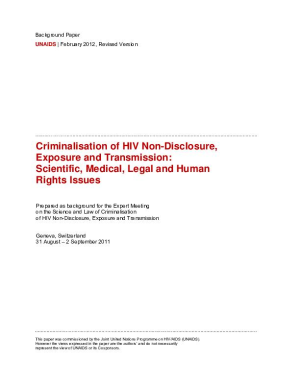Criminalisation of HIV Non-Disclosure, Exposure and Transmission: Scientific, Medical, Legal and Human Rights Issues
This paper was commissioned by the UNAIDS Secretariat to serve as a background paper for the Expert Meeting on Criminalisation of HIV Non-Disclosure, Exposure and Transmission, 31 August – 2 September 2011, Geneva, Switzerland. It synthesises general considerations concerning issues raised by the application of the criminal law to non-disclosure, exposure or transmission in relation to HIV Scientific, Medical, Legal and Human Rights Issues.

